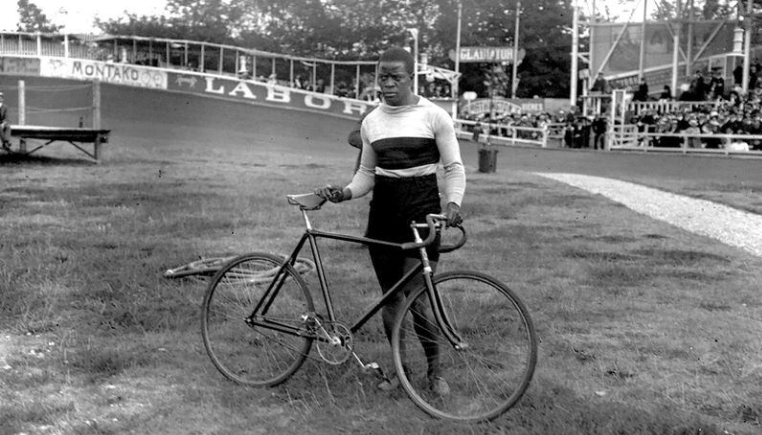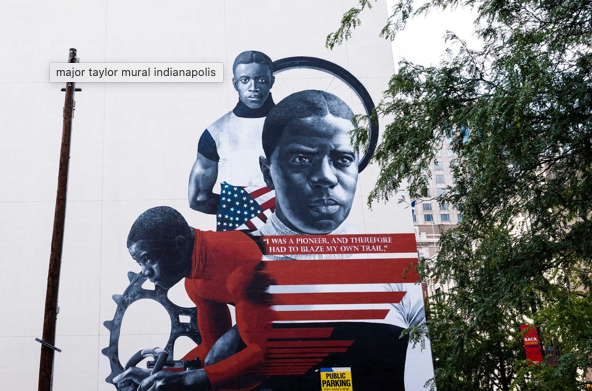On the wall of a tiny American one-room museum in Massachusetts, there’s a black-and-white photo taken in 1901 of a man hunched over his racing bicycle, eyes trained on the photographer. His fingers are clenched over the drop bars, his muscles bulging under his woollen sweater and you can feel the intensity in his gaze.
Today, most people likely have no idea who this man is, but Marshall “Major” Taylor wasn’t just a world champion at a time when cycling was one of the most popular international sports; he was also the first African American sports superstar.Taylor’s unlikely rise to stardom took place at the height of Jim Crow oppression in the United States. Born in 1878, he was raised in Indianapolis, Indiana, the son of a Civil War veteran. As a child, he received a bicycle as a gift and began performing tricks in front of a local bike shop to attract customers. He sought to improve his cycling skills at a local YMCA, but they refused to train him because of the colour of his skin. Undaunted, he started competing in any race that would allow African Americans to compete and showed a precocious talent for short, high-intensity sprints.Taylor soon caught the attention of Louis “Birdie” Munger, a retired penny farthing bicycle racer and entrepreneur. Munger tested how fast Taylor could sprint a single mile and timed him at two minutes and nine seconds – only two seconds behind the world record in 1893. Munger became Taylor’s mentor, sponsor and coach. In 1895, Munger invited a young Taylor to live in Worcester, Massachusetts, where Munger had opened a new bicycle factory. Unlike in Indianapolis, Taylor was allowed to join the YMCA in this more-progressive community, and it was here where he began training in earnest. He lived in Worcester most of his life, from 1895 to 1930, and became known locally as ‘The Worcester Whirlwind.’ However there were still obstacles, such as white neighbours’ objections when Taylor bought a house in Worcester. But ultimately, Taylor made a comfortable home in Worcester, and Worcester remains justifiably proud that a local resident became an international sports superstar.
Taylor became a legend in his day, winning countless track races and smashing world records. A devout Christian, Taylor cultivated a straight-edge personality, abstaining from alcohol and tobacco and refusing to compete on Sundays. Even by today’s modern racing standards, his stats remain astonishing. In 1898, for example, he sprinted 1km in 57.6 seconds – the current record set by Dutch cyclist Jeffrey Hoogland is 55.433 seconds.
Still, Taylor faced unending hostility in his home country. In 1885, the US League of American Wheelmen (now known as the League of American Bicyclists) attempted to ban Black people. Newspapers published mocking caricatures of Taylor, and when he was allowed to compete, brass bands would play “Dixie” (which originated with racist minstrel shows in the 1850s and became the de facto anthem of the Confederacy during the US Civil War) when his name was announced. Advertisements framed Taylor’s races as a battle between Black and white athletes, and opponents routinely used vicious tactics on the track, attempting to trap him in a group or dangerously upend his bike. During one race in Taunton, Massachusetts, a white racer pulled Taylor from his bike and choked him into unconsciousness.As Jim Crow-era racial segregation intensified at the turn of the 20th Century, hotels and restaurants across the US refused to serve Taylor. As a result, promoters invited the athlete to race in Canada, Europe and Australia, where the press welcomed him and spectators packed the stands. Taylor helped popularise the safety-bicycle, the modern alternative to the dangerous penny farthings that preceded them. Yet, his breakneck racing schedule put a strain on his health and marriage, and sports writers scrutinised his every move.Like many athletes, Taylor faded into obscurity after retiring in 1910. A passionate writer, Taylor composed a 600-page memoir but failed to find a publisher, and lost money after deciding to self-publish it. Many of his pursuits, such as a degree in engineering and reinvention as a car salesman, petered out over time. Taylor moved to Chicago at the onset of the Great Depression and eventually died in 1932, penniless and forgotten. He was only 52 years old.
His story remained an obscure footnote until 1988 when author Andrew Ritchie revived interest in the athlete by writing the book Major Taylor: The Extraordinary Career of a Champion Bicycle Rider. The book helped propel Taylor to be inducted into the US Bicycling Hall of Fame in 1989. It also inspired the creation of The Major Taylor Association in Worcester to “recognize sportsmanship, promote nonviolence, and care for those less fortunate”. The Association erected a statue of Taylor in 2008 which now stands in front of the Worcester Public Library, just down the street from the one-room museum dedicated to him.
“Since the statue effort began, Major Taylor cycling clubs have sprouted across the country, with a few overseas,” said Tolman. “More than 80 cycling clubs, many of them named for Major Taylor, have supported the Major Taylor Association’s efforts financially. The clubs are the organisation’s ambassadors, helping to educate people in their communities about the champion’s life and legacy.”
Truely an amazing sportsperson with tremendous courage and determination by not allowing the rules of the time to dampen his desire and dreams.



